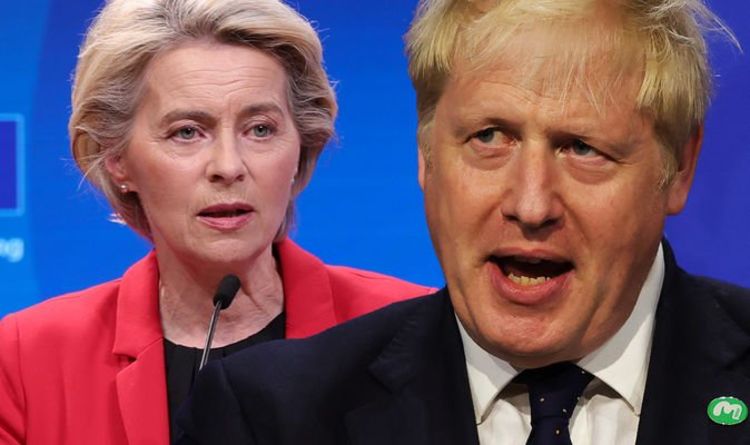Brexit: EU rules 'out of the question' for UK says Menon
We use your sign-up to provide content in ways you’ve consented to and to improve our understanding of you. This may include adverts from us and 3rd parties based on our understanding. You can unsubscribe at any time. More info
Brexit talks between UK minister Lord Frost and EU counterpart Maros Sefcovic have now resumed following months of non-direct contact, with a range of Brexit issues still far from being resolved. The most pressing area of discussion will be finding an answer around the successful implementation of the Northern Ireland Protocol, which has seen tensions between the two sides erupt this year. In order to ensure there is no hard border, Northern Ireland effectively remains part of the European Union’s single market for goods, with trade checks on some goods crossing from Great Britain.
Lord Frost wants to completely overhaul the Protocol and eliminate any customs controls ordered by the EU, but Brussels has continued to refute any possibility of the mechanism being renegotiated.
Ben Harris-Quinney, chairman of the Bow Group think tank, has been critical of the Protocol and warned the “UK Government has weakened its position by agreeing to a bad deal”.
He has urged Britain to get “tough and ruthless” to ensure there is frictionless trade between Northern Ireland and the rest of the UK.
But he believes pressure is building for renegotiation, but warned the British not to “waste” it and repeat another disastrous outcome similar to that seen with the Protocol.


Mr Harris-Quinney said: “The UK Government has weakened its position by agreeing to a bad deal, however the EU appear to be softening to the necessity of renegotiation.
“An advantage for the UK is our very close relationship diplomatically and economically with Northern Ireland and Ireland.
“Every possible point of leverage must be used and the UK will need to be tough and ruthless in order to facilitate a situation where there is frictionless trade between Northern Ireland and the rest of the UK, and special circumstances that allow for much swifter trade between Ireland and the UK.
However, the political expert went onto warn: “Ultimately no one benefits from the current situation, but the pressure is building on the necessity to renegotiate, and it appears inevitable sooner or later.

“What the UK Government cannot afford to do is to waste that renegotiation and agree another bad deal that doesn’t work.”
The Bow Group chairman also urged the UK Government to publicly concede it got it wrong with the Protocol.
But he warned in doing so, and if the EU continue its refusal to renegotiate, Britain needs to trigger Article 16, which would override key parts of the mechanism and effectively tear up the agreement.
Mr Harris-Quinney continued: “The first thing the Government needs to do is admit and accept the Northern Irish Protocol is not fit for purpose.
DON’T MISS
Britons furious as EU risks tearing UK apart [REACTION]
Boris urged to get tough on French as fishing fury erupts [COMMENTS]
UK rejected EU’s Belfast demand before heated talks over red tape [REPORT]


“It needs to be renegotiated and therefore all parties need to return to the table.
“At this time there seems to be a softening on the EU’s side, but if the EU refuse to renegotiate then the UK needs to suspend the Northern Irish Protocol via Article 16, as it is clearly not working for the people of the UK.”
Earlier this week, the EU once again rejected Britain’s demands to renegotiate the Protocol, insisting the two sides must resolve the problems on trade around the mechanism they had already agreed on.
European Commission vice president Mr Sefcovic told a news conference: “Let’s focus on the concrete problem. Let’s not try to renegotiate the protocol.

“This is definitely not our aim and I believe that we can find the good solution to the outstanding issues.”
Boris Johnson reiterated his Government’s position on the Protocol during the weekly Prime Minister’s Questions session on Wednesday, insisting the Protocol, as it was being applied, was not protecting the Good Friday Agreement.
He told MPs in the House of Commons: “We must sort it out.”
Source: Read Full Article
